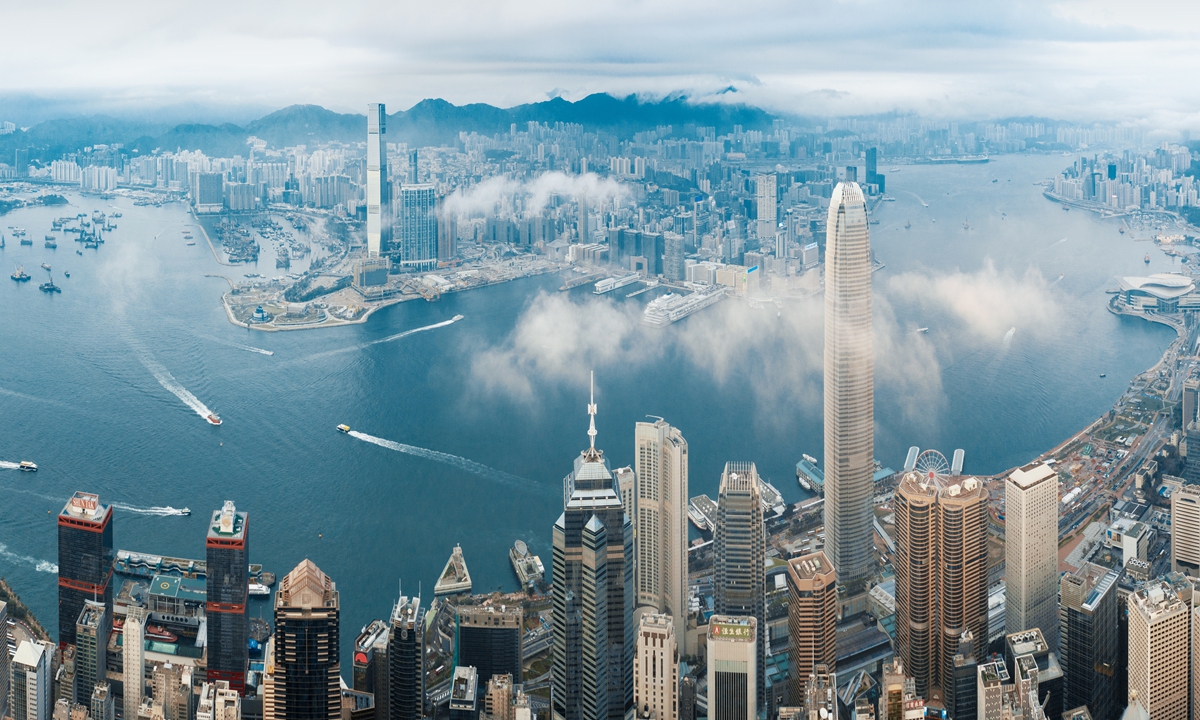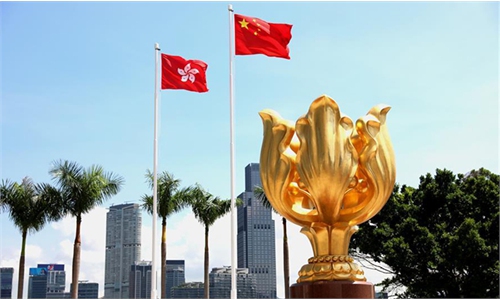
The view of Hong Kong Photo: VCG
There is a country where politicians want to arrest and fine you just for wearing a mask at a protest, or send you to jail for up to six months for shouting too loudly at a public demonstration. If the police think your protest event is causing "more than minor" disruption, they can arrest you. In fact, there is a whole raft of legislation designed to stifle dissent in this country. It disguises this incremental form of repression as well-intended measures to protect public order and safety - but it is designed to protect only itself from criticism. This is Britain.So it came as something of a surprise when British Foreign Secretary David Cameron had the nerve to launch an attack on the Article 23 legislation of the Basic Law of the Hong Kong Special Administrative Region (HKSAR), which is intended to combat crimes such as espionage, sabotage, sedition and external interference. Rather disingenuously, then, Cameron ignored this and claimed instead that the law would be used to stifle freedom of expression. He claimed that British officials had raised their concerns with the government in Hong Kong, and he urged the authorities there to "reconsider their proposals." What pompous rot.
There's an old English saying which states that people living in glass houses shouldn't throw stones. Its message is a simple truth which Cameron might do well to heed: that it is foolish to accuse others of something of which you yourself are guilty. A more forthright way of putting it might be to say "Don't be such a hypocrite."
One would have thought that a politician with such vast experience - he led the Conservative Party for 11 years and was British prime minister for six of them before retiring from politics, and then returning in his present role - would have had more sense than to take the proposed new security law so out of context and say that the measures designed to combat crimes like terrorism and sedition would be used to stop legitimate peaceful protest.
The day after Cameron spoke, US State Department spokesman Matthew Miller took his cue from the foreign secretary and also hit out at Article 23 legislation. One specific criticism, which echoed Cameron's concerns, was that legal definitions were too "broad and vague" and would be subject to wide interpretation. Ironically, critics had the same criticism of 2022's Police, Crime and Sentencing and Courts Act of Britain. They accused Britain of concocting "vague and undefined police and government powers to clamp down on any protests."
Britain's war on protesters took on an added dimension this week when Prime Minister Rishi Sunak accused protesters who demonstrated outside parliament, town halls or the offices of politicians of "mob rule," and - despite the convention that politicians should not interfere with police operational matters - urged the country's chief constables to get tougher with them. It is ironic that this is the same country which praised the Hong Kong rioters of 2019. Former home secretary Suella Braverman has recently described hundreds of thousands of protesters demonstrating on Britain's streets against the killing in Gaza as "hate" marchers. All of these things amount to an attempt to curb and criminalize the right to protest.
Sunak also said this week, this time without any sense of irony, that UK protesters are trying to "shout down free debate," despite his trying to do precisely that with new laws aimed at deflecting legitimate protest against politicians. It certainly seems to be the case in the UK, if recent polls are correct. It is estimated that an extraordinary 65 percent of the British population disapproves of the government, with just 16 percent approving of it. No wonder people in Britain want to protest - and no wonder politicians want to stop them.
The author is a journalist and lecturer in Britain. opinion@globaltimes.com.cn


